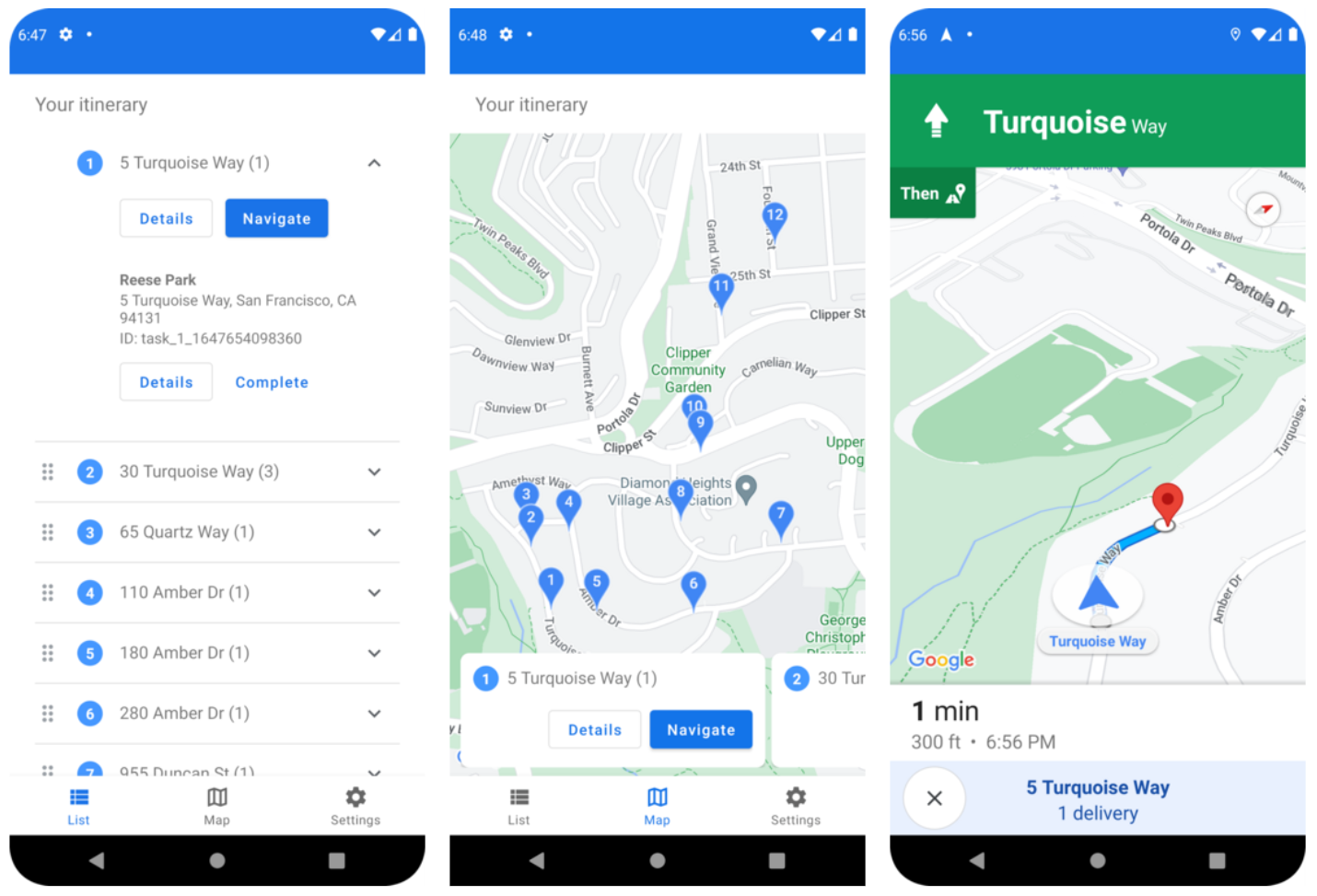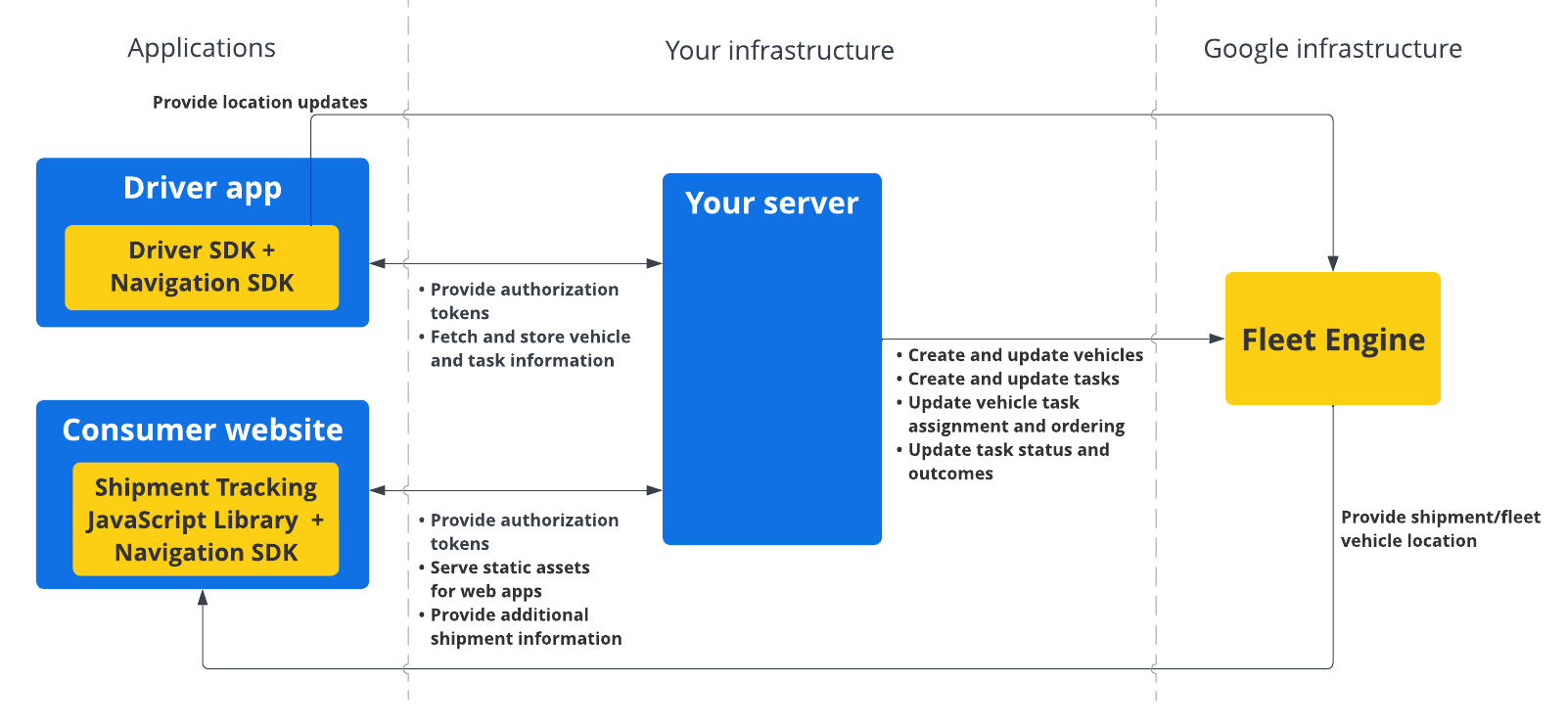
L'SDK Driver è un toolkit per app mobile e un componente fondamentale di Fleet Engine. Con questo SDK, l'app per i conducenti può gestire le assegnazioni di lavoro e attivare le funzionalità di navigazione e itinerari per i conducenti.
Prima di iniziare
Questa guida presuppone che tu abbia letto quanto segue:
- Nozioni di base di Fleet Engine.
- Il modello di dati per i veicoli.
- Il modello di dati per le attività pianificate.
- Come configurare Fleet Engine.
- Come creare e utilizzare i veicoli in Fleet Engine.
Che cos'è il Driver SDK per le attività pianificate?
L'SDK Driver comunica a Fleet Engine gli aggiornamenti relativi alla posizione del veicolo e alle attività, in modo che Fleet Engine possa gestire i veicoli di consegna e le relative fermate e attività di consegna assegnate. Nella sua essenza, l'SDK utilizza un listener di eventi per inviare aggiornamenti della posizione e coordinate di latitudine/longitudine, insieme al segmento di percorso e alla destinazione correnti dall'SDK Navigation a Fleet Engine quando l'autista inizia a guidare.
Perché utilizzare il Driver SDK per le attività pianificate?
L'SDK Driver consente una più facile integrazione con Fleet Engine per gli aggiornamenti dei percorsi dell'autista. Con questo SDK, l'autista può utilizzare una sola app per gestire gli incarichi e navigare come farebbe con la versione consumer di Google Maps, ma senza dover passare a un'altra app.
Cosa puoi fare con il Driver SDK per le attività pianificate
Utilizza l'SDK Driver per le attività pianificate per comunicare quanto segue con Fleet Engine:
- Posizione in tempo reale del veicolo di consegna su una mappa.
- Coordinate di latitudine/longitudine della fermata.
- Distanza rimanente dalla fermata.
- Orario di arrivo stimato alla fermata.
- Il percorso che deve seguire il veicolo, come fornito dall'SDK Navigation.
Come funziona l'SDK Driver per le attività pianificate
L'SDK Driver dipende dall'SDK Navigation per le informazioni sul percorso e sulla destinazione. Insieme alle informazioni dell'SDK Navigation, l'SDK Driver si integra con l'app per i conducenti e fornisce a Fleet Engine un flusso di aggiornamenti della posizione, coordinate di latitudine/longitudine, distanza rimanente e ETA. Tutti gli altri aggiornamenti dei dati del veicolo devono essere inviati al backend del cliente, che trasmette i dati a Fleet Engine.

Come utilizzare Driver SDK per le attività pianificate
Seleziona la tua piattaforma per scoprire come iniziare a utilizzare l'SDK Driver.
Android
| 1 | Scaricare l'SDK Driver per Android | Per maggiori informazioni, vedi Scaricare l'SDK Driver. |
| 2 | Configurare un progetto della console Google Cloud | Per maggiori informazioni, vedi Configurare un progetto della console Google Cloud. |
| 3 | Dichiarare le dipendenze | Per ulteriori informazioni, consulta Dichiarare le dipendenze. |
| 4 | Crea token di autenticazione | Per saperne di più, vedi Creare token di autenticazione. |
| 5 | Inizializza l'SDK Driver | Per ulteriori informazioni, vedi Inizializzare l'SDK Driver. |
| 6 | Prepara il veicolo | Per saperne di più, vedi Preparare il veicolo. |
iOS
| 1 | Scaricare l'SDK Driver per iOS | Per maggiori informazioni, vedi Scaricare l'SDK Driver. |
| 2 | Configurare un progetto della console Google Cloud | Per maggiori informazioni, vedi Configurare un progetto della console Google Cloud. |
| 3 | Crea token di autenticazione | Per saperne di più, vedi Creare token di autenticazione. |
| 4 | Inizializza l'SDK Driver | Per ulteriori informazioni, vedi Inizializzare l'SDK Driver. |
| 5 | Prepara il veicolo | Per saperne di più, vedi Preparare il veicolo. |
Passaggi successivi
Consulta la documentazione della piattaforma su cui vuoi configurare l'SDK Driver:

